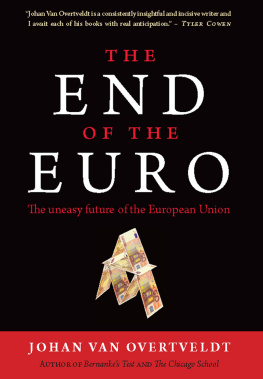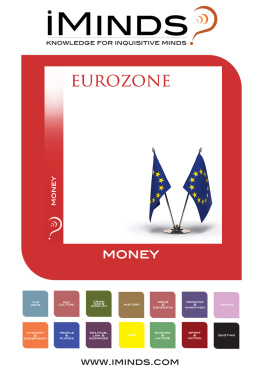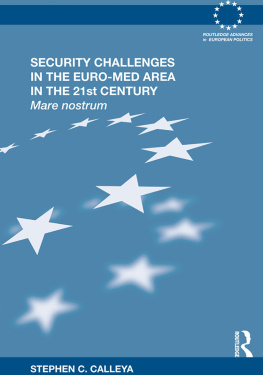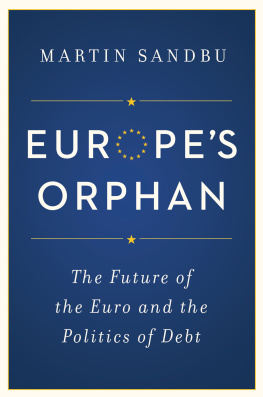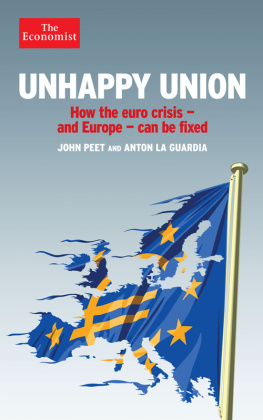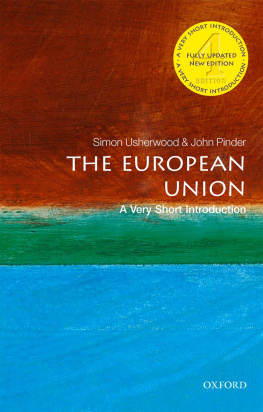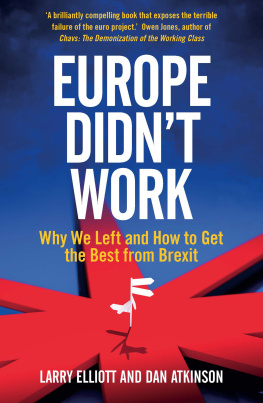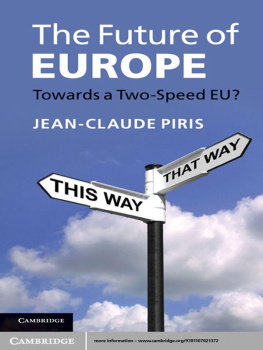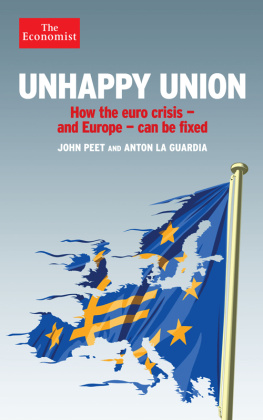Johan Van Overtveldt - The End of the Euro: The Uneasy Future of the European Union
Here you can read online Johan Van Overtveldt - The End of the Euro: The Uneasy Future of the European Union full text of the book (entire story) in english for free. Download pdf and epub, get meaning, cover and reviews about this ebook. year: 2011, publisher: Agate B2, genre: Politics. Description of the work, (preface) as well as reviews are available. Best literature library LitArk.com created for fans of good reading and offers a wide selection of genres:
Romance novel
Science fiction
Adventure
Detective
Science
History
Home and family
Prose
Art
Politics
Computer
Non-fiction
Religion
Business
Children
Humor
Choose a favorite category and find really read worthwhile books. Enjoy immersion in the world of imagination, feel the emotions of the characters or learn something new for yourself, make an fascinating discovery.
- Book:The End of the Euro: The Uneasy Future of the European Union
- Author:
- Publisher:Agate B2
- Genre:
- Year:2011
- Rating:3 / 5
- Favourites:Add to favourites
- Your mark:
- 60
- 1
- 2
- 3
- 4
- 5
The End of the Euro: The Uneasy Future of the European Union: summary, description and annotation
We offer to read an annotation, description, summary or preface (depends on what the author of the book "The End of the Euro: The Uneasy Future of the European Union" wrote himself). If you haven't found the necessary information about the book — write in the comments, we will try to find it.
The End of the Euro: The Uneasy Future of the European Union — read online for free the complete book (whole text) full work
Below is the text of the book, divided by pages. System saving the place of the last page read, allows you to conveniently read the book "The End of the Euro: The Uneasy Future of the European Union" online for free, without having to search again every time where you left off. Put a bookmark, and you can go to the page where you finished reading at any time.
Font size:
Interval:
Bookmark:
END
OF THE
EURO
Though a phrase like the drama of the central banker might once have drawn snickers, today the chairman of the Federal Reserve has become something of a star. This contemporary history, from the 1970s chairmanship of Paul Volcker on, provides an excellent introduction to the current financial crisis. Its early for predictions, but Van Overtveldt portrays Bernanke as the man for the season: an academic focused on the Great Depression, Bernanke became a member of the Feds Board of Governors in 2002. Though conventional, Bernankes present approachfurther cutting the federal funds rate to spur liquidity, keeping his hands off interest ratesand belief in regulation, set him apart from Greenspan, while his commitment to transparency and clear communication align him with the new administration. Anyone who wants to understand the role of the Fed in the current crisis will find this an accessible primer.
Publishers Weekly
Should we feel better that the chairman of the Federal Reserve is an authority on the Great Depression? Perhaps so, suggests Belgium-based economist Van Overtveldt. Van Overtveldt is particularly clear when he examines pronouncements on the part of both Bernanke and Greenspan that he considers spectacularly wrong. A timely study that will help readers interpret the headlines.
Kirkus Reviews
Here at last is a book about the U.S. Federal Reserve that is neither impossibly technical nor populist. The author is obviously extremely familiar with the American financial and political scene. But, perhaps because he is resident in Belgium, he avoids the twin sins of U.S.-type blockbusters of excessive length and arch chapter headings and introductions such as: While Joe Smith was trimming his lawn the telephone rang it was the White House.
Samuel Brittan, Financial Times
Far more than a trot through the dry record of academic papers. Recollections, in interviews with the author or from published sources, illuminate personalities, rows and controversy. This is an admirably detailed and thoroughly welcome history of a great centre of economic thought.
The Economist
A landmark in the history of economic thought.
Tyler Cowen
END
OF THE
EURO
The uneasy future of the European Union
JOHAN VAN OVERTVELDT

AN AGATE IMPRINT
CHICAGO
Copyright 2011 Johan Van Overtveldt.
All rights reserved. No part of this book may be reproduced or transmitted in any form or by any means, electronic or mechanical, including photocopying, recording, or by any information storage and retrieval system, without express written permission from the publisher.
First ebook edition 2011
ISBN-13 978-1-57284-688-3
ISBN-10 1-57284-688-7
The Library of Congress has cataloged the paperback edition of this book as follows:
Library of Congress Cataloging-in-Publication Data
Overtveldt, Johan van.
The end of the euro : the uneasy future of the European Union / Johan Van Overtveldt.
p. cm.
Includes bibliographical references and index.
ISBN-13: 978-1-932841-61-9 (hard cover : alk. paper)
ISBN-10: 1-932841-61-X (hard cover : alk. paper)
ISBN-13: 978-1-57284-688-3 (ebook : alk. paper)
ISBN-10: 1-57284-688-7 (ebook : alk. paper)
1. Euro. 2. European currency unit. 3. Currency question--European Union countries. 4. European Union countries--Economic policy. 5. Monetary policy--European Union countries. I. Title.
HG925.M854 2008
332.494--dc23
2011034982
15 14 13 12 11
B2 Books is an imprint of Agate Publishing.
Agate books are available in bulk at discount prices. For more information, go to agatepublishing.com .
NOTHING IS POSSIBLE WITHOUT MEN AND WOMEN, BUT NOTHING IS LASTING WITHOUT INSTITUTIONS.
Jean Monnet, founding father of European Unity
WHAT WENT WRONG WASNT WHAT HAPPENED THIS YEAR. WHAT WENT WRONG WAS WHAT HAPPENED IN THE FIRST ELEVEN YEARS OF THE EUROS HISTORY. IT WAS LIKE SOME KIND OF SLEEPING PILL, SOME KIND OF DRUG. WE WERENT AWARE OF THE UNDERLYING PROBLEMS.
Herman Van Rompuy, president of the European Union
IN A WORLD OF SOVEREIGN STATESNOTHING CAN BE REGARDED AS TRULY IRREVERSIBLE.
Benjamin Cohen, professor of international political economy at theUniversity of California, Santa Barbara
THE CURRENCY UNION IS OUR COMMON DESTINY. IT IS A QUESTION, NO MORE OR LESS, OF THE PRESERVATION OF THE EUROPEAN IDEA. THAT IS OUR HISTORICAL TASK: FOR IF THE EURO FAILS, THEN EUROPE FAILS.
Angela Merkel, German chancellor
THE EUROPEAN SINGLE CURRENCY IS BOUND TO FAIL, ECONOMICALLY, POLITICALLY, AND INDEED SOCIALLY, THOUGH THE TIMING, OCCASION, AND FULL CONSEQUENCES ARE ALL NECESSARILY STILL UNCLEAR.
Margaret Thatcher, British Prime Minister, 19791990
THERE IS NO CRISIS OF THE EURO.
Jean-Claude Trichet, president of the European Central Bank
IT IS PREPOSTEROUS FOR EUROPEAN POLITICIANS TO CLAIM THAT THE WHOLE CRISIS IS BEING CAUSED BY IRRATIONAL MARKETS.
Kenneth Rogoff, Harvard professor and former chief economist of the
International Monetary Fund
By Robert Z. Aliber
J OHAN VAN OVERTVELDTS SHORT BOOK ABOUT THE euro is most timely because of the financial crisis in Greece, Spain, Portugal, and Irelandand the extensive deliberations in national capitals about sustaining the euro. The narrative is both comprehensive and punchy. The first chapter focuses on history, laying out the political forces (especially in France) that led to efforts at reducing nationalist barriers within Europe to the movement of goods, services, and human talent among countries. The second chapter is analytical, asking whether the major countries in Europe would together pass the criteria for an optimum currency area. The third chapter focuses on the financial crisis that has rocked the eurozone since 2009, and the fourth and final chapter is the authors judgment that Germany will leave the euro because the financial costs of continued adherence are too high.
The European Union is a work in progress, and the adoption of the euro was one more step in writing its constitution. Constitutions define rights, privileges, obligations, and commitments, and provide the rules and procedures for amending the statements on rights and obligations. Actions and decisions become precedents which then are attached to the constitution, although with lesser legal standing than the articles.
The U.S. Constitution was written in a few weeks over the summer of 1776, when the thirteen colonies were about to declare their independence from Britain, the mother country. A war was imminent because King George III would not accept the unilateral action of the colonists. The initiative to write a constitution reflected that the prior contract, the Articles of Confederation, did not provide for a sufficiently strong central authority when the colonies were about to be involved in a war. Four or five individuals from each of the thirteen colonies participated in the drafting the constitution. Four million people then lived in the thirteen colonies; they shared a language, a culture, and a modest historybut there were commercial rivalries among the colonies and between the agricultural interests in some states and the mercantile interests in Pennsylvania and New York. The agricultural states wanted a less powerful central authority.
Developing the constitution for the new Europe is much more complex and involves a series of treaties over more than fifty years. These treaties were sometimes named after the city where the treaty was established and sometimes after an individual. Van Overtveldt provides a succinct and comprehensive history of this development The first treaty established the Coal and Steel Community, which involved six countries. Now the Union involves twenty-six countries and more than three hundred million people. Their cultural histories differ and they have had many many wars and territorial and other disputes. The larger participating countries have ten to twenty times the population and economic clout of the smaller ones. The process of building the new Europe is very pragmaticvery Anglo-Saxon.
Font size:
Interval:
Bookmark:
Similar books «The End of the Euro: The Uneasy Future of the European Union»
Look at similar books to The End of the Euro: The Uneasy Future of the European Union. We have selected literature similar in name and meaning in the hope of providing readers with more options to find new, interesting, not yet read works.
Discussion, reviews of the book The End of the Euro: The Uneasy Future of the European Union and just readers' own opinions. Leave your comments, write what you think about the work, its meaning or the main characters. Specify what exactly you liked and what you didn't like, and why you think so.

